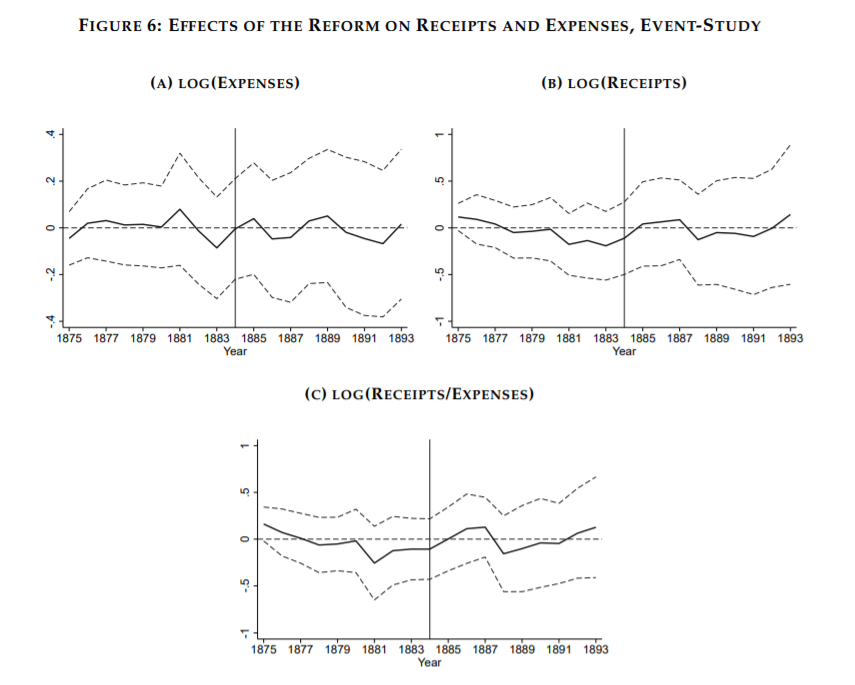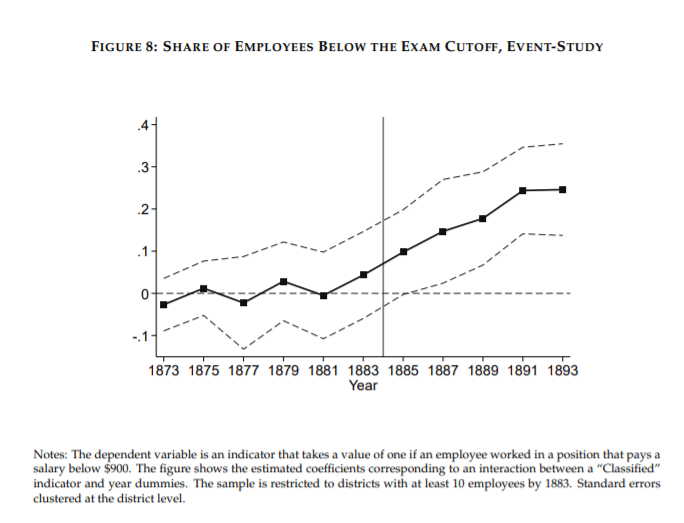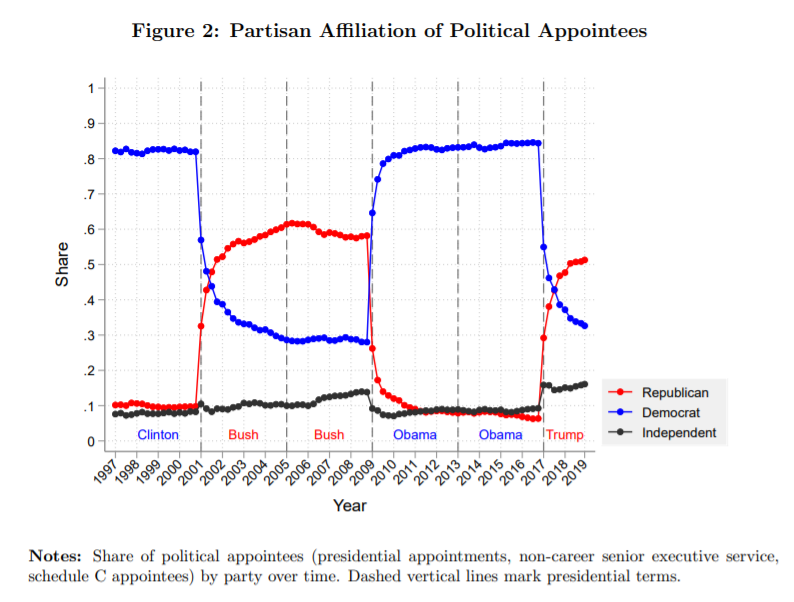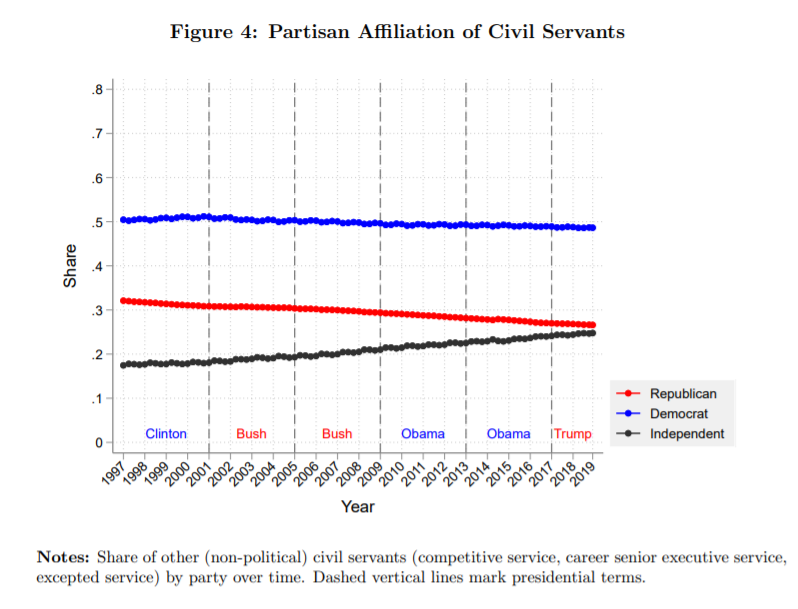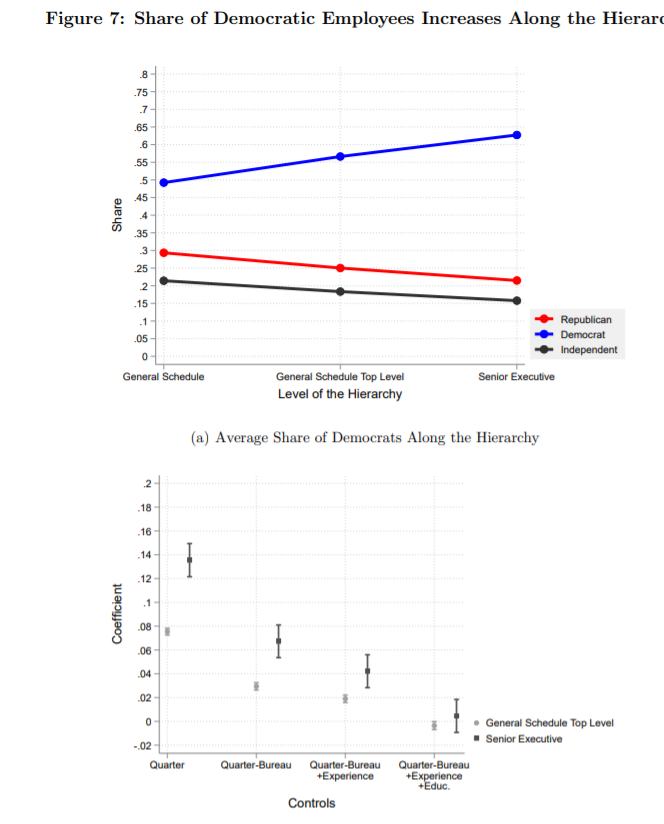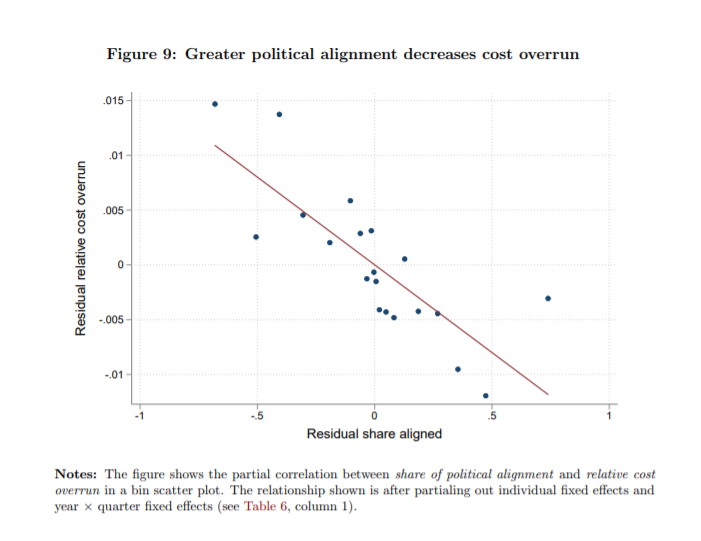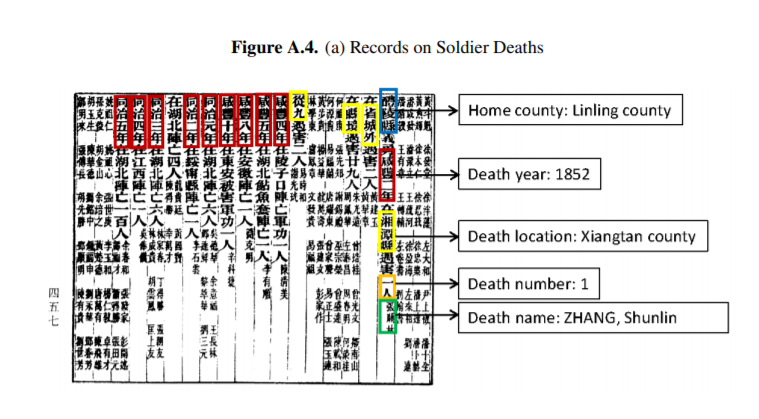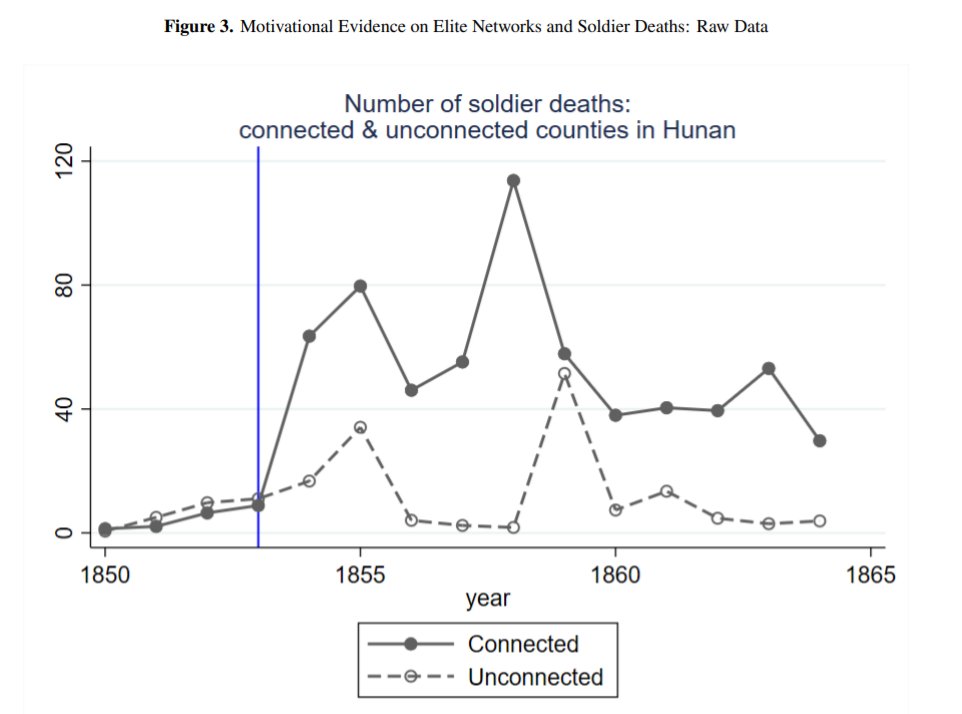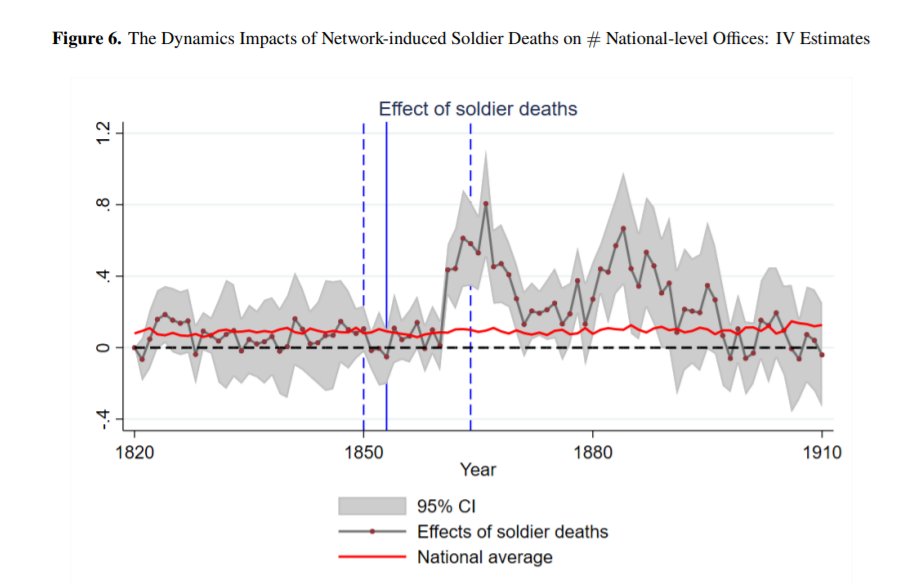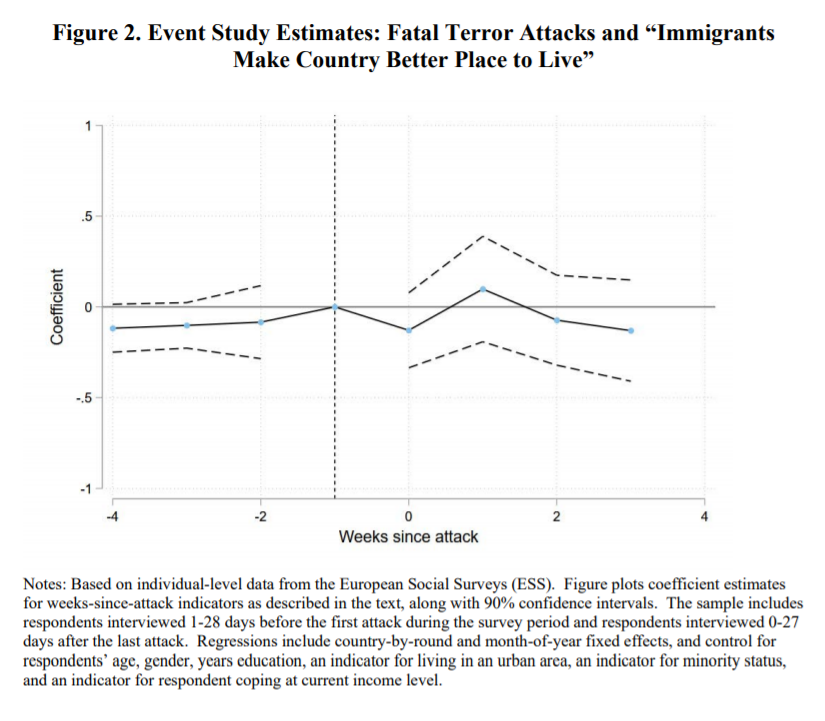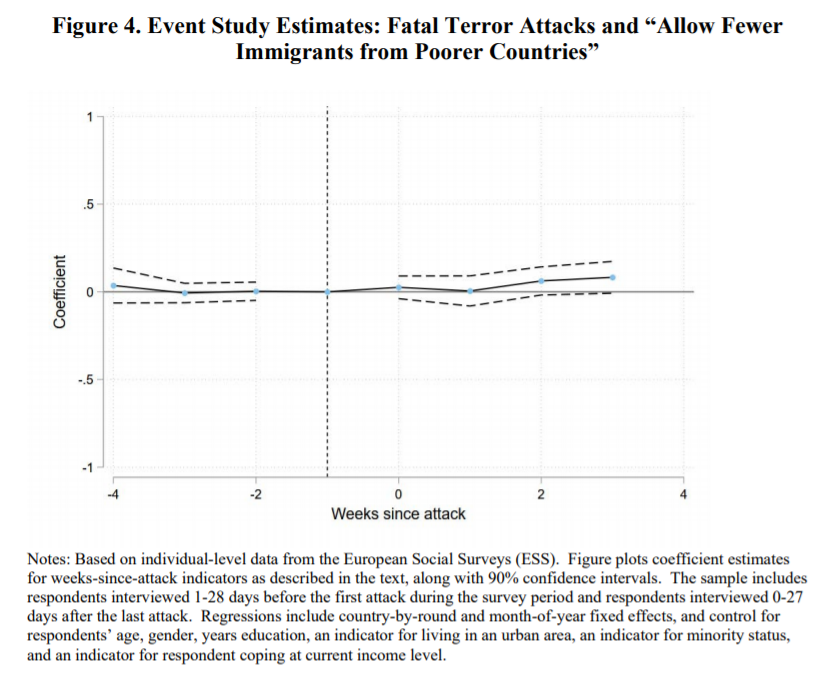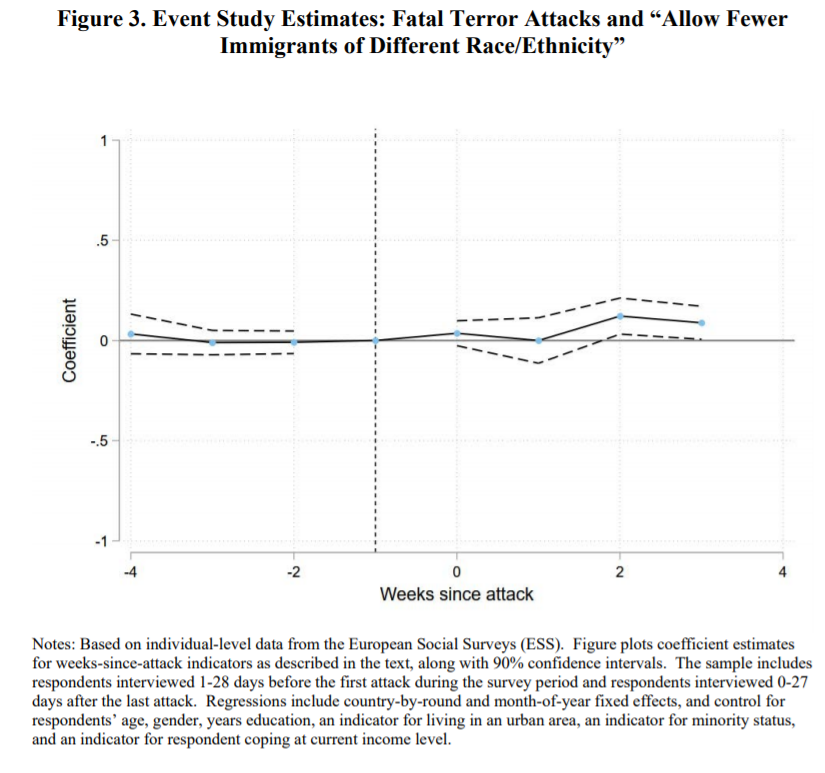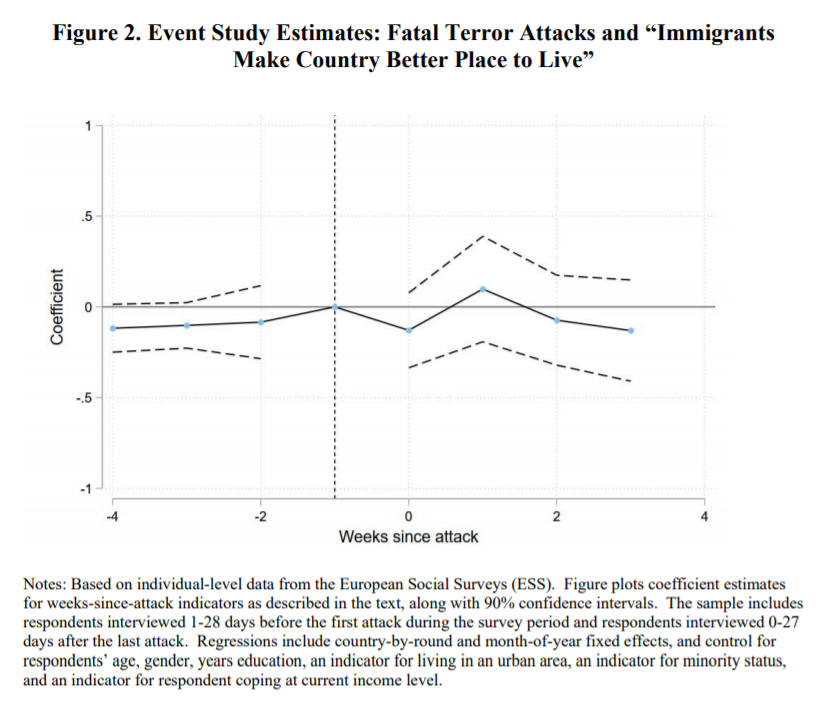Lots of cool #NBERday papers today!
We& #39;ll focus on two papers tackling a big question:
Q: Does the US have a politically neutral civil service?
A: No.
#NBERday
https://www.nber.org/papers/w28673 ">https://www.nber.org/papers/w2... https://www.nber.org/papers/w28665 ">https://www.nber.org/papers/w2...
We& #39;ll focus on two papers tackling a big question:
Q: Does the US have a politically neutral civil service?
A: No.
#NBERday
https://www.nber.org/papers/w28673 ">https://www.nber.org/papers/w2... https://www.nber.org/papers/w28665 ">https://www.nber.org/papers/w2...
The first paper digitized personnel records of staff at U.S. Customs offices before and after the 1885 Pendleton Act. The Pendleton Act reformed the US Civil Service system to reduce its use for political patronage. It imposed a civil service exam for some posts. #NBERday
In the conventional story of US civil service history, the Pendleton Act is lionized. There had been decades of ever-worsening corruption in the US civil service, and finally Rutherford B Hayes made a determined effort to tackle the issue. #NBERday
He made some headway, but nothing statutory or permanent. Garfield came into office to continue pushing for civil service reforms. But he was assassinated.... by a guy who was passed over for a patronage job. #NBERday
His VP, Chester A. Arthur, had formerly been a U.S. customs office head, and customs offices were THE key patronage position, so he was intimately familiar with the issue. He pushed through the Pendleton Act limiting patronage appointments. #NBERday
In the conventional story, Hayes, Garfield, and Arthur form a kind of trifecta of determined reformers for the cause. Basically, the Guilded Age power dynamic precluded serious *social* reform, so they embarked on *civic* reform. #NBERday
Sry, Gilded Age. #NBERday
The Pendleton Act, we are to believe, began the rise of a professionalized, apolitical bureaucracy.
That& #39;s the story.
But.... is it true? #NBERday
That& #39;s the story.
But.... is it true? #NBERday
Well, these folks digitized all the personnel and office management records for about 25 years of US customs office data to see what actually happened! #NBERday https://www.nber.org/papers/w28665 ">https://www.nber.org/papers/w2...
Basically, Pendleton reforms only applied to customs offices with over 50 staff members, and certain positions were exempted. This gives them plausibly exogenous variation. #NBERday
In their dataset, by end of period, they get 12 customs posts affected by the change, and a whole bunch who were not affected. It& #39;s a smallish sample of affected districts so effects are noisy. #NBERday
Turnover declined in Pendleton-covered districts. This is good: most turnover was associated with changes in partisanship of leadership, so lower turnover likely reflects less patronage. #NBERday
But..... there was zero change in revenues collected, expenses per office, or revenues per expense. The exam-hired staff were simply NOT more efficient than the old patronage employees! #NBERday
So what we can say is that the Pendleton Act appears to have *departisanized* the civil service segments it covered, but it did not *professionalize* them. They were no more efficient than before. #NBERday
Plus, it turns out that managers evaded the Pendleton requirements. See, positions earning under $900/yr were ALSO exempted.
Here& #39;s what happened to the share of employees and new hires making under $900.... #NBERday
Here& #39;s what happened to the share of employees and new hires making under $900.... #NBERday
So, the Pendleton Act achieved SOME departisanization of the bureaucracy..... but..... not very much. #NBERday
Let& #39;s follow up 120 years later: US personnel records of bureaucrats 1997-2016 matched to voter registration data! #NBERday https://www.nber.org/papers/w28673 ">https://www.nber.org/papers/w2...
SO to start with, political appointments are CLEARLY (obv) partisan.
Democrats have more extreme partisanship in political appointments than Republicans do. Republicans have a lot of Democratic political appointees! #NBERday
Democrats have more extreme partisanship in political appointments than Republicans do. Republicans have a lot of Democratic political appointees! #NBERday
Trump did not even succeed in getting **50%** of political appointments filled with Republicans!
Folks when I talk about how the GOP absolutely sucks at having a farm-team of people who can seize the reigns of the bureaucracy.... here& #39;s what I mean! #NBERday
Folks when I talk about how the GOP absolutely sucks at having a farm-team of people who can seize the reigns of the bureaucracy.... here& #39;s what I mean! #NBERday
GOP presidents get elected so that they can make half of the political appointees Democrats.
#NBERday
#NBERday
Simple objective for the next Republican president:
80% of political appointments held by registered Republicans by day 365. #NBERday
80% of political appointments held by registered Republicans by day 365. #NBERday
And what about civil servants?
Republicans are rare in the bureaucracy *and getting rarer*. Bureaucrats are almost as likely now to be independents as Republicans. The bureacracy is overwhelmingly Democratic. #NBERday
Republicans are rare in the bureaucracy *and getting rarer*. Bureaucrats are almost as likely now to be independents as Republicans. The bureacracy is overwhelmingly Democratic. #NBERday
The bias grows even more at the top levels of the bureaucracy, which makes up a lot of the "feedstock" for political appointments.
Most of the bias is explained by experience at grade and education. #NBERday
Most of the bias is explained by experience at grade and education. #NBERday
So basically, a bias exists *at the time of hiring*, but it grows over time as Democrats stay in government longer and accrue experience, and Republicans exit. Democrats make up a bigger share of plausible candidates for appointments, so dominate political appointees. #NBERday
The result of this is that Democratic bureaucrats slow-walk Republican projects and blow up costs.
The paper says it& #39;s due to "morale effects." Which is a cute way of saying "sabotage." #NBERday
The paper says it& #39;s due to "morale effects." Which is a cute way of saying "sabotage." #NBERday
They use "cost overruns on contracts" because it& #39;s objective and they have data for it. But you can imagine how this plays out in areas that have even *less* accountability. Bureaucrats do not serve loyally when they disagree. #NBERday
As a formal Federal worker I think it& #39;s important to note that this is often explicit and intentional. People talk openly about slow-walking administration priorities due to disagreement. #NBERday
I said Democrats slow-walk: obviously Republican bureaucrats do too, but there& #39;s like literally twice as many Democrats, so as a mere fact of math it& #39;s necessarily mostly Democrats. #NBERday
Folks you all know I& #39;m radicalized on civil service reform but this is pretty solid proof that what we need is a quota system. Hard to know how to structure it fairly, but our system is giving bureaucrats huge amounts of democratically unaccountable policy control. #NBERday
The bureaucracy IS partisan. They DO impose their priorities even *over and against* the outcomes of elections. This results in macroeconomically significant cost overruns: assuming 50% of procurement is mismatched, government overpays on average by 4%. #NBERday
At ~9% of GDP, a cost overrun of government procurement of 3% on average (being conservative), bureaucratic political interference wastes $60 BILLION PER YEAR.
Folks, THAT IS PRACTICALLY A CHILD ALLOWANCE. #NBERday
Folks, THAT IS PRACTICALLY A CHILD ALLOWANCE. #NBERday
For the amount of money that bureaucrats spend sabotaging political programs they dislike, we could *checks notes* increase the child tax credit by about $800, fully refundable for everyone. #NBERday
Trump& #39;s war on the bureaucracy was stupid because it was incompetent, going after the wrong targets, and had no component of actual systematic reform.
But any right-thinking leader, and ESPECIALLY a Republican, should be going to war with the bureaucracy. #NBERday
But any right-thinking leader, and ESPECIALLY a Republican, should be going to war with the bureaucracy. #NBERday
And folks that is ****just procurement overrun****. Misadministration of programs could run up even higher costs. #NBERday
Okay, let& #39;s stay on the subject of internal dynamics of the state.... but now by "the state" we mean "the Qing Dynasty in the 19th century."
This paper is studying what effect the Taiping Rebellion had on intra-elite politics in late-Qing China. #NBERday
This paper is studying what effect the Taiping Rebellion had on intra-elite politics in late-Qing China. #NBERday
But we have to talk about data because it& #39;s so cool.
Folks, more and more old Chinese data is getting linked and digitized. Qing examination scores, Banner army recruitment records, clan geneologies, and here: casualty lists from the Hunan Army! #NBERday
Folks, more and more old Chinese data is getting linked and digitized. Qing examination scores, Banner army recruitment records, clan geneologies, and here: casualty lists from the Hunan Army! #NBERday
There are now datasets out there linking together, *millions* of Chinese people (generally elites and sometimes their families) across *centuries* of data. The speed at which new data is being added and access files and tools improving is awesome. #NBERday
So this paper basically exploits a weird historical fact: the Taiping Rebellion was a HUGE civil war in the mid-19th century which totally overwhelmed the "official" Qing army& #39;s ability to suppress it. The conventional army couldn& #39;t get the job done. #NBERday
So this "scholar-general" (i.e. elite nobleman) named Zeng Guofan basically assembled his personal wealth and that of some allies and put together a private army (called here the "Hunan Army"). They succeeded where the official army failed. #NBERday
A note on terms: the Taiping Rebellion is a controversial name for this event. Some argue for names casting it as a revolution, a civil war, a state-building project, or other things. "Taiping" itselt is a somewhat debated term! #NBERday
The authors of the paper use two sets of data to explore "what happened" with the Hunan Army (which in Chinese tw is *not* called the Hunan Army but 湘軍. #NBERday
One set basically identifies Zeng& #39;s pre-war social network. Who were his classmates in exam studies? His family? His in-laws? Coworkers? Because of the aforementioned records, we can actually reconstruct a ton of detail on his personal network! #NBERday
We can then locate those people in time and space and see where they lived when. This creates a *spatial and temporal map* of Zeng& #39;s personal network: a map of where, when, and from whom he would plausibly have gotten help building the Hunan Army. #NBERday
Sidenote, I would really like to read a detailed study, more like an ethnography, of "how to recruit an army." Throughout history ambitious warlords just go out and do this, but the historians are always kinda vague on what this actually *means*. #NBERday
Like suppose I want to build an army and go adventuring to conquer some lands for me and my soldiers. What are the steps I need to follow?
This paper traces some mechanisms but really we need like an ethnography of ISIS. #NBERday
This paper traces some mechanisms but really we need like an ethnography of ISIS. #NBERday
The second datasat is published gazettes in Hunan which list casualties. The data looks like this in its original form: #NBERday
But they transform it into this, a map of where about 30,000 Hunan Army soldiers died in battle. #NBERday
So basically they are assuming that wartime deaths of soldiers are approximately reflective of overall recruitment patterns. I& #39;m not 100% sure that& #39;s correct.... but meh, reasonable enough. #NBERday
And here& #39;s a graph of soldier deaths per capita in two groups of Hunan counties: those where Zeng had a lot of elite friends, and those where he did not. #NBERday
So that *sure looks like* Zeng& #39;s elite friends helped him recruit soldiers who fought in battles and generated casualty data! #NBERday
Why does this matter?
Simple, because after the Taiping Rebellion, men from Hunan largely run the show of Chinese history for the next century. WHY dudes from Hunan suddenly vault to the top is a subject of much historical discussion. #NBERday
Simple, because after the Taiping Rebellion, men from Hunan largely run the show of Chinese history for the next century. WHY dudes from Hunan suddenly vault to the top is a subject of much historical discussion. #NBERday
The popular historiographic theory has always been that basically the Hunan Army officers connected to Zeng suddenly had tons of power and prestige (And loyal soldiers....) and were rewarded, and then they perpetuated a new Hunanese elite. #NBERday
And that view.... is basically correct. Post-ware, people from Hunanese counties with high connection to Zeng pre-war suddenly capture a TON more national offices. #NBERday
But we can do better than this!
If we interact Zeng-connectedness and soldier-deaths and assume this interaction term is a proxy for "lots of Zeng-connected officers," we can *formally estimate* the "Hunan army officer effect." #NBERday
If we interact Zeng-connectedness and soldier-deaths and assume this interaction term is a proxy for "lots of Zeng-connected officers," we can *formally estimate* the "Hunan army officer effect." #NBERday
This paper speaks to some really interesting questions. It suggests that wars are often a tool for intra-elite competition. Think of the songs in Hamilton about how a war can allow Hamilton to rise above his station. #NBERday
Those new elites then seek to perpetuate themselves. Folks, want to know another prominent Chinese leader from Hunan?
Mao Zedong.
#NBERday
Mao Zedong.
#NBERday
This is a really excellent demonstration of a case where conflicts about "who gets to be an elite" seem to have directly shaped the course of both sides of the war (the Taiping leader was a repeat exam flunker arguing for an alternative hierarchy). #NBERday
When large bodies of people perceive the existing pathways to elite status to be unsatisfying or unsuitable, when there are lots of people who feel they SHOULD be elites but they& #39;re locked out of it, they seek alternative pathways. #NBERday
Let& #39;s stay on violence and politics....
Q: Do terrorist attacks cause people to adopt more right-wing opinions?
A: Apparently not!
#NBERday
https://www.nber.org/papers/w28662 ">https://www.nber.org/papers/w2...
Q: Do terrorist attacks cause people to adopt more right-wing opinions?
A: Apparently not!
#NBERday
https://www.nber.org/papers/w28662 ">https://www.nber.org/papers/w2...
This paper exploited the fact that it can take days or weeks to administer a whole survey to a large population, and that in Europe many surveys are running at a time. As a result there are lots of surveys occurring essentially concurrently with terrorist attacks. #NBERday
Terrorist attacks are probably close-enough to exogenous so we can see how surveyed opinions change IMMEDIATELY before/after terrorist attacks in a given area or country. #NBERday
Terrorist attacks lead to qualitatively small and mostly insignificant changes in opinions about, for example, immigrants. #NBERday
In general this study found few or no political effects *at all*, maybe a modest rally-round-the-flag effect in the specific region where an attack occurred. #NBERday

 Read on Twitter
Read on Twitter
